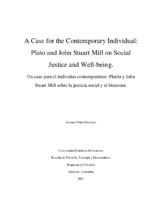| dc.contributor.advisor | Fernández, Carlos Esteban | |
| dc.contributor.author | Ochoa Restrepo, Susana | |
| dc.date.accessioned | 2022-01-28T18:54:00Z | |
| dc.date.available | 2022-01-28T18:54:00Z | |
| dc.date.issued | 2021 | |
| dc.identifier.uri | http://hdl.handle.net/20.500.11912/9864 | |
| dc.description | 37 páginas | spa |
| dc.description.abstract | Plato’s Republic is a treatise that tries to present an answer, systematically and objectively, to the fundamental problem of how we must live within a city, and, more specifically, the problem that arises necessarily from humans coexisting under a certain political organization, that is, the problem of justice within the city. Similarly, John Stuart Mill’s Utilitarianism provides a simpler alternative to the demands of more well-known rigid moral structures, and sets forth clear concepts within his utilitarian theory, one of which is to ensure justice. So if society nowadays is characterized by the “loss of an ability to think about values in a systematic way”, 1 which is precisely what the understanding of these traditional values is about, the question that follows is: What can the concept of social justice in Plato’s Republic and John Stuart Mill’s Utilitarianism contribute to the wellbeing of the individual within western contemporary society?. This article is developed after revising quite strenuously some of the literature found on the subject, and to gain some critical insight on the workings of Plato’s Republic and Mill’s Utilitarianism, which leads to the application of the theory towards a conceptual proposition regarding its application to our society, which will be understood after comparing Plato’s and Mill’s philosophies. We will also see how in our days the concept of justice is fleeting, and the very essence of the individual is threatened y by comparing him to the individual of the Republic who has a purpose because he is just in his soul and seeks to achieve justice through his job, and the utilitarian individual who is guaranteed a little more than his mere survival by the welfare State, thus allowing him to not depend on it as long as he can and freeing him to act with justice also. | spa |
| dc.format.mimetype | application/pdf | |
| dc.language.iso | spa | |
| dc.rights | Attribution-NonCommercial-NoDerivatives 4.0 International | * |
| dc.rights.uri | http://creativecommons.org/licenses/by-nc-nd/4.0/ | * |
| dc.subject | Platón , 427 - 347 a.C. . República de Platón -- Crítica e interpretación | spa |
| dc.subject | Mill, John Stuart , 1806 - 1873 . El utilitarismo -- Crítica e interpretación | spa |
| dc.subject | Justicia | spa |
| dc.subject | Bienestar social | spa |
| dc.subject | Filosofía política | spa |
| dc.subject | Filosofía moral | spa |
| dc.subject | Valores (Filosofía) | spa |
| dc.subject | Ética filosófica | spa |
| dc.title | A Case for the Contemporary Individual : Plato and John Stuart Mill on Social Justice and Well-being | spa |
| dc.type | bachelorThesis | spa |
| dc.publisher.department | Escuela de Teología, Filosofía y Humanidades | spa |
| dc.publisher.program | Filosofía. | spa |
| dc.type.hasVersion | draft | spa |
| dc.description.sectional | Medellín | spa |
| dc.description.degreename | Filósofo | spa |


